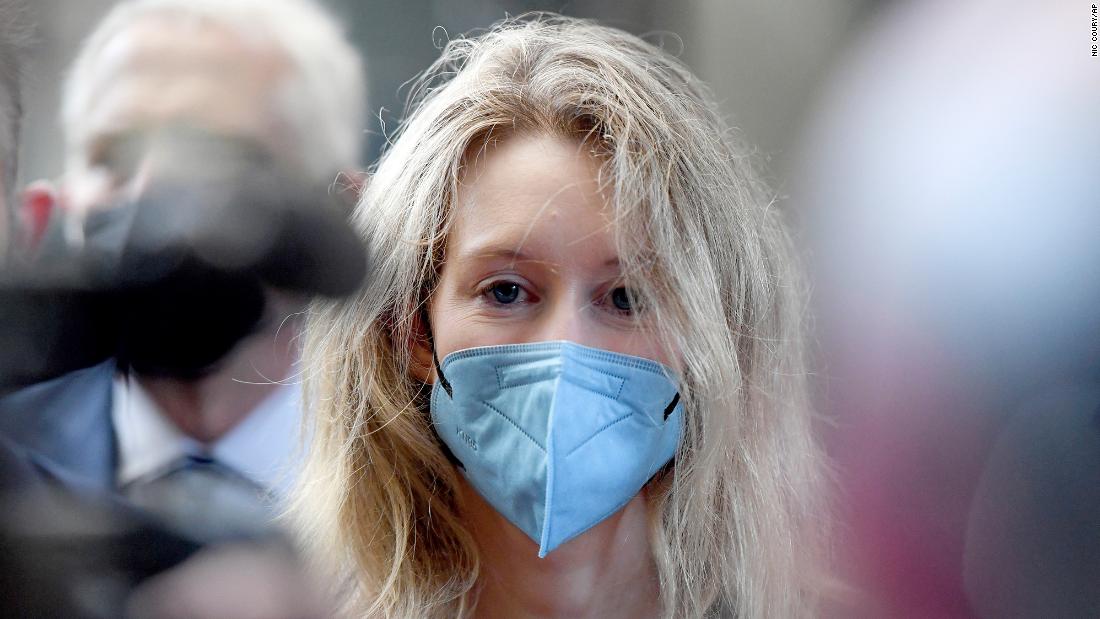
The day kicked off what will likely be a matter of months under intense media scrutiny. The issue of possible juries was central to the concern that the frenzy surrounding Holmes, including several documentaries and podcasts about his rise and fall, could distort those who will ultimately determine his fate.
Holmes arrived at the Robert F. Peckham Federal Building shortly before 8:30 a.m. wearing a blue medical mask and a dark blazer. She was immediately surrounded by media, some of whom had arrived several hours earlier to secure a seat in the room.
Throughout the day, Holmes’ attorneys, federal prosecutors and Judge Edward Davila questioned possible jurors. Of Tuesday’s 39 candidates for the jury, 14 were excused for a variety of reasons, including the financial strain of being part of a jury for so long. On Wednesday, 46 new potential jurors are expected to be questioned.
Holmes, 37, was charged more than three years ago with multiple charges of federal fraud and conspiracy on charges of knowingly distorting the capabilities of her company’s proprietary blood testing technology. She has pleaded not guilty and has up to 20 years in prison.
Of particular concern to Holmes and his defense is the amount of exposure potential jurors have had to the deluge of media coverage of her, her company, and the trial. In the company’s heyday, Holmes was the object of much fascination and media attention that enchanted her and her efforts. His downfall has not diminished that focus: from documentaries, an upcoming limited series and a planned feature film to at least two podcasts dedicated to covering the trial.
In addition to 12 jurors, there will be five alternates. Delays in the trial, due to the coronavirus pandemic and the birth of Holmes’ first child, may have only made it difficult to find a group of jurors who have not yet heard of Holmes or Theranos.
Judge Davila was careful about how he posed questions to potential jurors about media coverage to prevent respondents from sharing details about what they have consumed about the case so as not to bias other potential jurors. Judge Davila asked them when they read or heard anything related to Holmes or Theranos, but not about the details of what they had read. He told potential jurors that they had to reveal any controversial or strong opinion in private rather than within the group.
Potential jurors mentioned that they found news related to Theranos and Holmes everywhere, from YouTube, to Reddit (r / investing), to documentaries and NPR. But many said they felt they could stay impartial if they were selected. (One said he received an NPR notification about the jury selection starting Tuesday. “My first thought was ‘Yes, yes, I know,'” he said.)
A potential jury said it previously read “Bad Blood,” the definitive book on the rise and fall of Theranos by reporter John Carreyrou. She said she had assumed that stating that she had read that book as part of a lengthy potential questionnaire would disqualify her from being on the jury, regardless of whether she confirmed or denied the possibility of setting aside possible biases.
Some said they remembered hearing about the company or Holmes, but did not know exactly what they were consuming. A potential jury said he believed he had seen “First Blood.”
Prior to jury selection, nearly 200 potential jurors completed the final 28-page jury questionnaire, which asked questions about everything from his vaccination status to his knowledge of Holmes and his media consumption habits. About half indicated they had consumed media related to the case, according to a court file filed last week.
Tuesday’s first layoff was a man who said he worked as a producer on a radio station. He said the writing had covered in anticipation of the jury selection. “The audio is all around me,” he said, noting that news, including from the trial, is hard to avoid because of his work.
Judge Davila suggested to potential jurors before a lunch break that they turn off news alerts on their phones to avoid media exposure.
Possible jurors were also asked if they had any experience with interpersonal abuse or violence. Several said that they, or loved ones, did.
The pandemic, which has delayed the trial several times, is very close to the backdrop. Judge Davila said there were no presentations among possible jurors scheduled to attend today, citing some who called to talk about symptoms and were told to stay home. He said all court staff had been vaccinated and spoke of a newly installed $ 7 million air conditioning system. “The air circulates completely through this courtroom about every 10 minutes,” he said. “I hope this gives you some comfort.”
Some of the potential jurors also spoke about the hardships they had experienced during the pandemic, saying they hoped to take a much-needed vacation that would be hampered by a months-long trial.
Some other potential jurors who were not in the courtroom were excused on Tuesday for reasons such as health, childcare, financial hardship, bias, school attendance, work obligations and travel challenges. Prosecution and defense attorneys have agreed to excuse potential jurors who are not vaccinated. Nine were excused to indicate on the questionnaire that they were not vaccinated.